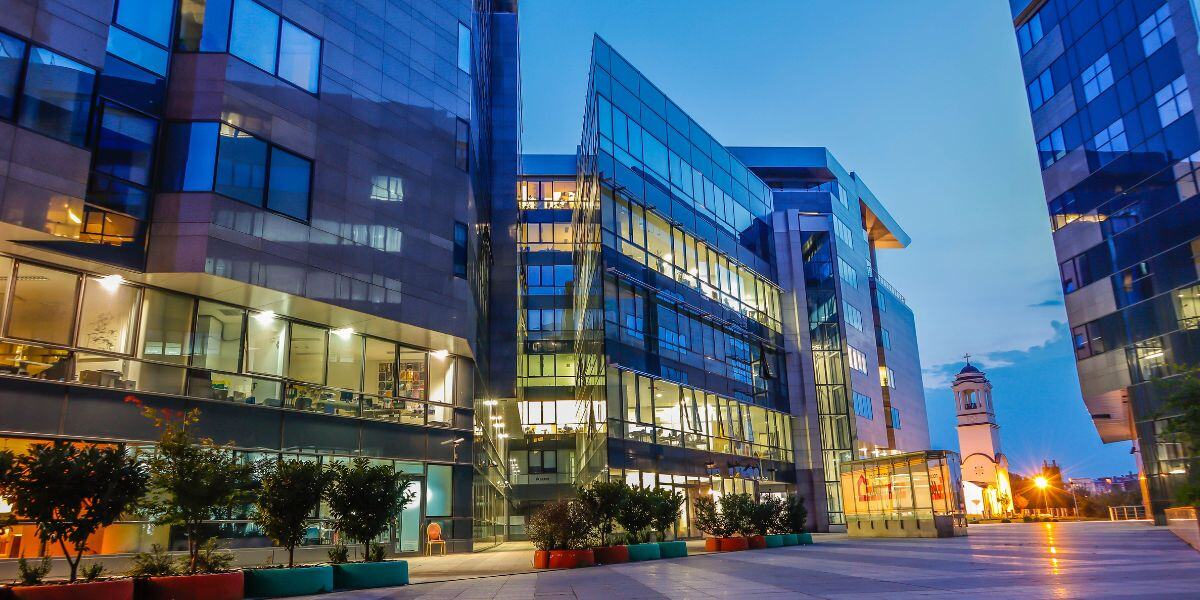Is Turning Off Your Commercial HVAC a Costly Mistake or a Smart Move?
April 9th, 2025
4 min read
By Dennis Allen

If you own or manage a commercial building, you might think turning off the HVAC system when no one is there will help you save money. After all, why pay to heat or cool an empty space?
At Harold Brothers, we’ve been working with HVAC systems in commercial buildings for over 16 years, and we’ve seen what happens when people turn off their systems completely. It might seem like a cost-effective idea, but it can actually lead to extensive problems like broken equipment, expensive repairs, and lost warranty coverage. These problems can cost more money than you hoped to save.
In this article, we’ll explain why turning off your HVAC can be risky, how it can hurt your system, and what it means for your warranty. You’ll also learn what you can do instead to save money and keep your building in good shape.
Why Some Building Owners Turn Off HVAC Systems to Save Money
In certain situations, turning off the HVAC system in a commercial building makes good financial sense. If the building will be unoccupied for a while—whether due to renovations, seasonal closures, or long-term vacancies—there may be little need to keep heating or cooling the space. Shutting down the system can reduce energy use, lower utility bills, and help extend the life of some HVAC components by reducing run time.
This approach can be especially helpful in buildings without sensitive materials or equipment that require temperature or humidity control. In cooler seasons, when temperatures are mild, the risk of extreme indoor climate changes may also be lower, making a shutdown seem like a reasonable option.
However, there are important things to consider before flipping the switch. Turning off the HVAC completely can lead to unwanted side effects, such as moisture buildup, equipment strain during restart, or even warranty complications if the system is not maintained properly during the downtime.
By weighing the benefits and risks, building owners can decide whether a full shutdown or a reduced operation mode is the best choice for their specific situation.
The Hidden Costs of Shutting Down Commercial HVAC Systems
Turning off your HVAC system might sound like a smart way to save money, but it can cause more problems than you might think. What seems like a quick cost-cutting move could lead to bigger issues down the line if not handled carefully.
Moisture and Mold Can Damage Your Property
When the HVAC system is off, the air in the building can get too humid. This makes it easier for mold and mildew to grow. Mold can spread fast and damage walls, ceilings, and furniture. High humidity can also make metal rust and cause wood to bend or break. Fixing these problems can cost more than what you save on energy.
HVAC Equipment Can Break Down from Inactivity
Even if the weather is nice, the HVAC system can still get damaged when it’s off. These systems are made to keep the temperature steady and the air moving. When the system is turned off for a long time, parts can wear out or break. When you turn it back on, it has to work extra hard to catch up, which can lead to more damage and early failure.
You Could Lose Your HVAC Warranty
Most HVAC companies require regular use and maintenance to keep the warranty valid. If something breaks because the system is off for too long, the manufacturer might not pay for the repairs. Some warranties even say that turning off the system for too long will cancel your coverage. That means if something goes wrong, you could be stuck with a big bill.
Smarter Ways to Manage HVAC in Unoccupied Commercial Buildings
There are better ways to save energy without turning the system off completely. These tips will help protect your HVAC system and save money at the same time.
Instead of shutting it off, try setting the thermostat to a mild temperature—around 55°F in the winter and 85°F in the summer. This keeps the air moving and stops things like mold and moisture damage.
Smart thermostats can help, too. They adjust the temperature based on when the building is being used and what the weather is like. This saves energy without fully turning off the system.
It’s also important to keep the air moving. You can run fans on low to keep the air from getting stale or humid.
Even if the building is empty, keep up with regular maintenance. Have a professional check the system every few months. They can catch small problems before they turn into big ones.
How to Safely Shut Down Your HVAC System (If You Have To)
Sometimes, turning off your HVAC system is necessary, like during renovations, equipment upgrades, emergencies, or long-term vacancies. If that’s the case, follow these steps to protect your building and equipment.
Control Humidity to Prevent Mold and Moisture Damage
Moisture is the biggest problem when the system is off. Use portable dehumidifiers to keep the air dry in damp areas. Check the humidity levels with a digital meter and try to keep it below 60%. Keep the inside doors open so air can move around the building.
Ventilate the Building While the HVAC Is Off
Even with the system off, you need fresh air. If the weather is nice, open windows or use temporary fans. Don’t seal the building too tightly—stale, moist air can cause mold and other problems.
Protect Equipment and Materials from Damage
Electronics, papers, and building materials can all be damaged by moisture and temperature changes. If possible, move them to a climate-controlled room. If not, cover them or add insulation to keep them safe.
Schedule a System Inspection Before Shutdown
Before you turn the system off, have a technician look at it. They can check for problems and help you shut it down safely. Each brand will have distinct instructions before you shut the system down.
Use Idle Mode or Smart Settings if Available
If your system has a Building Management System (BMS), your technician might be able to set it to “idle mode.” This keeps a little air and humidity control going without using full power. It’s a smart way to save energy and still protect your building.
Have a Plan for a Safe, Gradual System Restart
Turning the system back on should be done with care; don’t just flip the switch and hope it works. Set up a time for a professional to come in and do a safe restart. Bring the temperature and humidity up slowly so the system isn’t stressed.
Why Turning Off HVAC Could Cost Your Business More in the Long Run
Turning off your HVAC might sound like a simple way to save money, but it can lead to mold, equipment damage, high energy bills, and lost warranty coverage. In most cases, it’s better to keep the system running at a lower setting instead of shutting it down completely.
Now you know why turning off your HVAC system in an empty commercial building can end up costing more than it saves. The better choice is to adjust your thermostat, use smart tools, keep the air moving, and keep up with maintenance.
At Harold Brothers, we help businesses make smart HVAC decisions every day. If you have questions or need help managing your system, contact us. We’re here to help you protect your building and your budget.
Dennis Allen is the Chief Operating Officer and the Director of HVAC for Harold Brothers Mechanical. His current role includes overseeing daily operations in all aspects of the HVAC department from Estimating, Project Management, Equipment and Subcontractor procurement through completion of all HVAC projects. Dennis currently lives in Marshfield, Ma with his Wife of 15 years and their 2 children. Dennis is very involved in town youth sports and volunteers with Marshfield Youth Soccer and Hockey. You will see him at hockey rinks and soccer fields throughout New England on most weekends, when Dennis is not at the rink or fields, he enjoys spending time with family and friends and is frequently spotted fishing in Duxbury Harbor. Dennis takes pride in his upbringing in the mechanical industry, he started as an apprentice in 2001 and has worked his way up through hard work and dedication in his field. He has worked on multiple large-scale projects throughout his career and credits his development to the tradesman who took him under their wing and provided the knowledge needed to succeed. In his current role he works closely with property owners and engineers to assure each and every project is designed to meet each client’s needs. He is very passionate in the success of the younger generation getting into the field and has donated his time to teach and educate field personnel on how to interpret design documents, installation practices and understanding of current codes. He believes all people regardless of background should be given the opportunity to enter the Pipefitting/Refrigeration industry and be set up for success. He recognizes that his industry is facing a major skilled trade shortage and is firm in his belief that training and education should be made available to all people looking to enter the trade. In 2016 he had the foresight to see our industry was evolving to more energy efficient systems and took a trip to Japan to educate himself on the Variable Refrigerant Flow systems which we currently see being implemented in designs throughout the commonwealth. The people of Japan have been utilizing this technology since the 1970’s and provided invaluable insight into how these systems get manufactured, installed and operate. In 2024 Dennis was appointed a member of the Massachusetts Board of Pipefitters, Refrigeration Technicians, and Sprinkler Fitters.
Topics: